Capsule review of this week’s Vinland Saga:
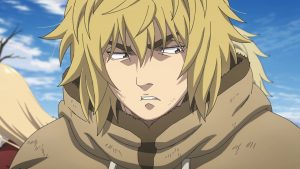 Vinland Saga has really become the king of cliffhangers, which is all the more frustrating because it’s on break next week. This week’s was a doozy, with one of the series’ ultimate battle scenarios about to play out. But there was a lot of buildup to get to that moment – and a lot of spattering blood and flying limbs, too. Watching all this play out makes me think, more than anything, about how fucking pointless most of it is. And that – ironically – is probably the point.
Vinland Saga has really become the king of cliffhangers, which is all the more frustrating because it’s on break next week. This week’s was a doozy, with one of the series’ ultimate battle scenarios about to play out. But there was a lot of buildup to get to that moment – and a lot of spattering blood and flying limbs, too. Watching all this play out makes me think, more than anything, about how fucking pointless most of it is. And that – ironically – is probably the point.
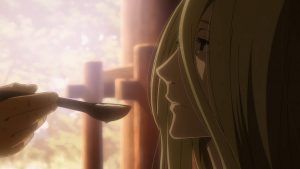 It’s dangerous, as always (see: Beastars), to infer meaning from a writer’s word with too much confidence. I don’t know exactly what Yukimura-sensei’s intentions are with the scenario playing out, or what he wants us to feel as we watch it. But it strikes me that we’re seeing an awful lot of suffering occurring as a result of what the author (maybe) sees as fantasy. How much has the Christians’ faith done for them so far? Meanwhile, the Danes relentlessly trudge into battle in the belief that Valhalla awaits them as long as they go down fighting. They’re not as different as they appear.
It’s dangerous, as always (see: Beastars), to infer meaning from a writer’s word with too much confidence. I don’t know exactly what Yukimura-sensei’s intentions are with the scenario playing out, or what he wants us to feel as we watch it. But it strikes me that we’re seeing an awful lot of suffering occurring as a result of what the author (maybe) sees as fantasy. How much has the Christians’ faith done for them so far? Meanwhile, the Danes relentlessly trudge into battle in the belief that Valhalla awaits them as long as they go down fighting. They’re not as different as they appear.
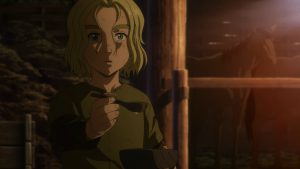 And then we have Askeladd. He’s always been the odd duck in this story – by far the most contemporary of the major characters, a thinker, a logician and a practician. But as we’ve been learning, he’s chasing a fantasy of his own – Avalon, the legendary kingdom of Artorius. His mother’s words to him as a child have clearly stuck, and while there’s a hard political reality to this (protecting the independence of Wales) I can’t help but think that the romance of Arthur and his own supposed lineage is partly what drives Askleladd. He doesn’t seem like the sort of man who’d be motivated by such romantic ideas – but even a hard man like Askeladd surely needs to believe in something to have persevered as long as he has and done the despicable things he’s done.
And then we have Askeladd. He’s always been the odd duck in this story – by far the most contemporary of the major characters, a thinker, a logician and a practician. But as we’ve been learning, he’s chasing a fantasy of his own – Avalon, the legendary kingdom of Artorius. His mother’s words to him as a child have clearly stuck, and while there’s a hard political reality to this (protecting the independence of Wales) I can’t help but think that the romance of Arthur and his own supposed lineage is partly what drives Askleladd. He doesn’t seem like the sort of man who’d be motivated by such romantic ideas – but even a hard man like Askeladd surely needs to believe in something to have persevered as long as he has and done the despicable things he’s done.
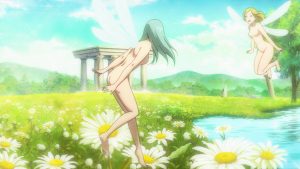 So we have Thorfinn, whose religion is revenge. Christians, who suffer in the belief that the Kingdom of Heaven awaits them. Vikings who fight and die in order to enter Valhalla, and Askeladd, whose religion is Avalon and all it implies. What’s the square peg here? The title, of course. Vinland seems like the most fantastical story of all, the whimsy and imagination of an eccentric old sailor, but unlike all the other ghosts the characters are chasing it’s demonstrably real. It’s not the paradise Leif implies, no, but it is a huge and bountiful land far beyond the horizon. It’s been largely missing from the narrative so far, but all that we’re seeing now leads me to think it’s going to play a large role in the story’s denouement (especially for Thorfinn).
So we have Thorfinn, whose religion is revenge. Christians, who suffer in the belief that the Kingdom of Heaven awaits them. Vikings who fight and die in order to enter Valhalla, and Askeladd, whose religion is Avalon and all it implies. What’s the square peg here? The title, of course. Vinland seems like the most fantastical story of all, the whimsy and imagination of an eccentric old sailor, but unlike all the other ghosts the characters are chasing it’s demonstrably real. It’s not the paradise Leif implies, no, but it is a huge and bountiful land far beyond the horizon. It’s been largely missing from the narrative so far, but all that we’re seeing now leads me to think it’s going to play a large role in the story’s denouement (especially for Thorfinn).
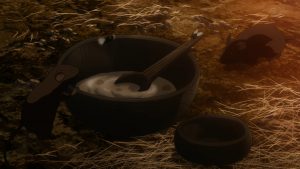 But all that is speculation, and the reality of the moment is that Askeladd’s world is collapsing around him. He finally admits the truth to his men, that he’s hated them and used them for years (a reckoning with Bjorn must surely come, sooner or later). He’s not going down without a fight of course, and he sends Bjorn and the boys fleeing while he makes a last stand and kills as many of his own men as he’s able. Which is a lot, much the chagrin of Torgrim (Gotou Hiroki, who I can finally credit now that his character has a name). Eventually Torgrim wises up and decides to leave it to the archers – a pointed irony, given the way Askeladd took down Tors all those years earlier.
But all that is speculation, and the reality of the moment is that Askeladd’s world is collapsing around him. He finally admits the truth to his men, that he’s hated them and used them for years (a reckoning with Bjorn must surely come, sooner or later). He’s not going down without a fight of course, and he sends Bjorn and the boys fleeing while he makes a last stand and kills as many of his own men as he’s able. Which is a lot, much the chagrin of Torgrim (Gotou Hiroki, who I can finally credit now that his character has a name). Eventually Torgrim wises up and decides to leave it to the archers – a pointed irony, given the way Askeladd took down Tors all those years earlier.
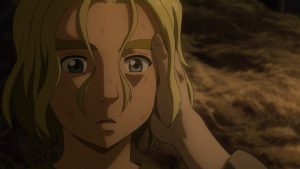 Thorfinn riding to save Askeladd from the exact fate his father suffered – the irony is indeed strong. Of course there’s another player here, Thorkell, and his arrival on the scene is Askeladd’s last wild card in hopes of escape. Naturally Thorkell has no use for any of the rebels from Askeladd’s camp – it wouldn’t have mattered if they still had the prince or not. But Thorfinn is in berserker mode that anyone else should be the one to take Askeladd’s scalp (and just maybe his feelings have become more complicated). And truthfully, all that is just fine with Thorkell, who does his best Blazing Saddles re-enactment and happily accepts a duel with Thorfinn, with Askeladd’s life in the balance.
Thorfinn riding to save Askeladd from the exact fate his father suffered – the irony is indeed strong. Of course there’s another player here, Thorkell, and his arrival on the scene is Askeladd’s last wild card in hopes of escape. Naturally Thorkell has no use for any of the rebels from Askeladd’s camp – it wouldn’t have mattered if they still had the prince or not. But Thorfinn is in berserker mode that anyone else should be the one to take Askeladd’s scalp (and just maybe his feelings have become more complicated). And truthfully, all that is just fine with Thorkell, who does his best Blazing Saddles re-enactment and happily accepts a duel with Thorfinn, with Askeladd’s life in the balance.
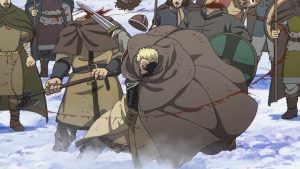 These are all fascinating people, no doubt, though it’s hard to feel a whole lot of sympathy for any of them. Askeladd has sold out everything and everyone on his one big gamble to try and honor his mother, Thorkell lives only to kill for the pleasure of it, and Thorfinn has dedicated his life to honoring his father in a way that would break his heart. I don’t find Torgrim any less sympathetic than the others – his actions make a lot of sense in the moment, and he even tries to give Askeladd the chance to flee. At least in Thorfinn’s case we can say that circumstances have led him so far astray – to experience what he did at the age he did would warp almost anyone. But sooner or later this story of revenge and consequentialism has to become a story of redemption, because otherwise it’s just (vastly entertaining) escapism and not really a “saga” at all.
These are all fascinating people, no doubt, though it’s hard to feel a whole lot of sympathy for any of them. Askeladd has sold out everything and everyone on his one big gamble to try and honor his mother, Thorkell lives only to kill for the pleasure of it, and Thorfinn has dedicated his life to honoring his father in a way that would break his heart. I don’t find Torgrim any less sympathetic than the others – his actions make a lot of sense in the moment, and he even tries to give Askeladd the chance to flee. At least in Thorfinn’s case we can say that circumstances have led him so far astray – to experience what he did at the age he did would warp almost anyone. But sooner or later this story of revenge and consequentialism has to become a story of redemption, because otherwise it’s just (vastly entertaining) escapism and not really a “saga” at all.


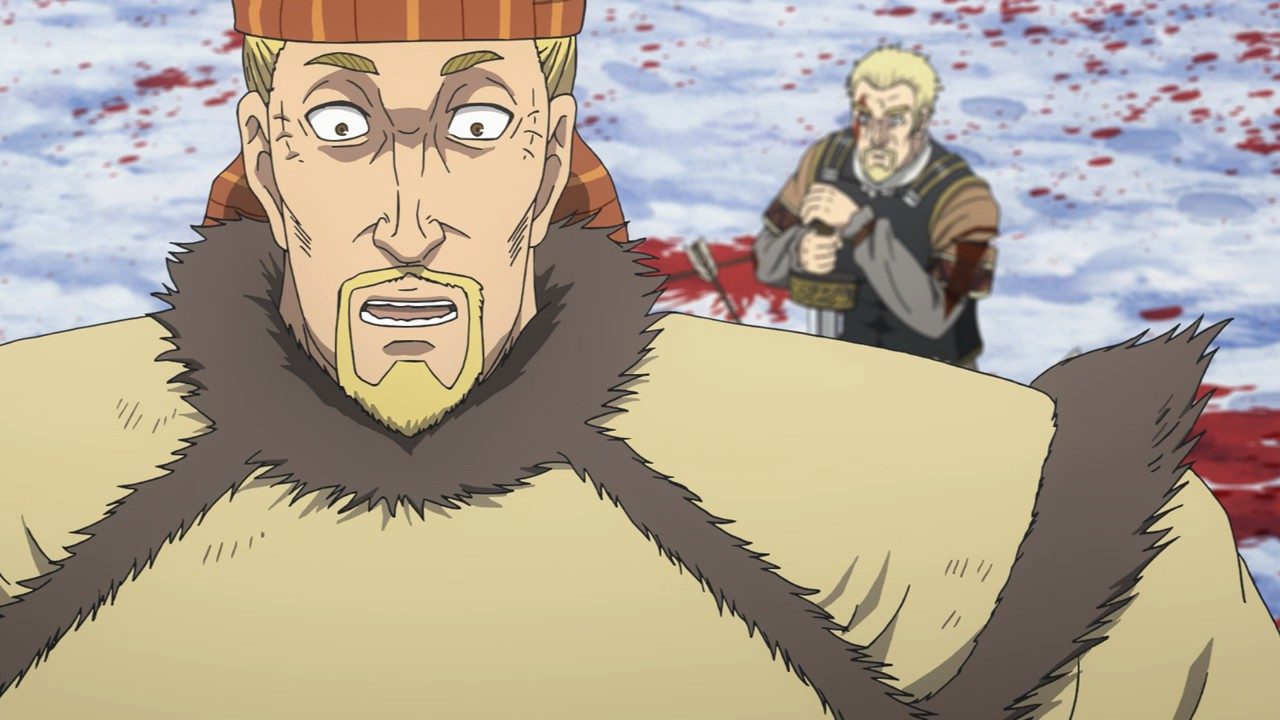
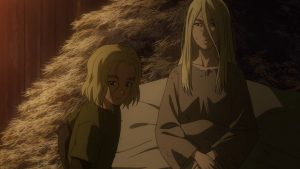
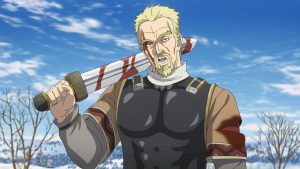
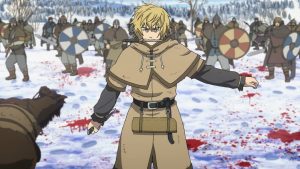
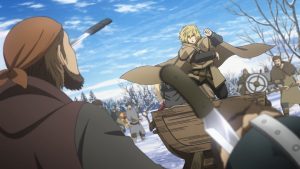
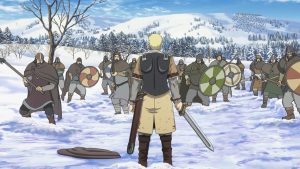
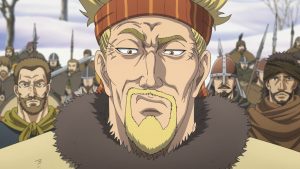
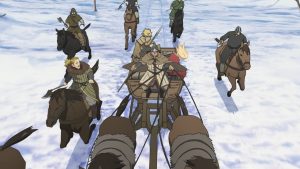
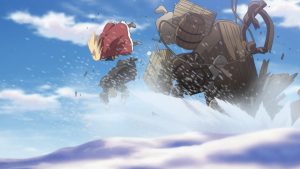
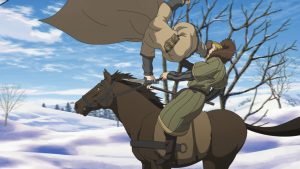
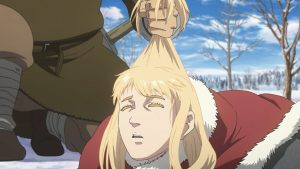
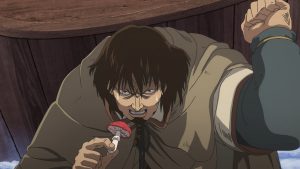
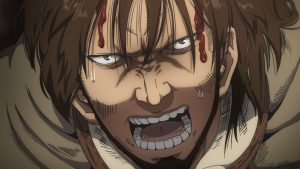
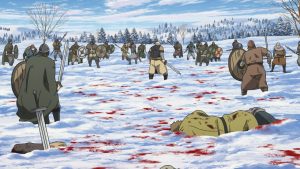
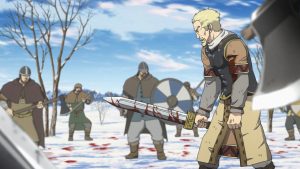
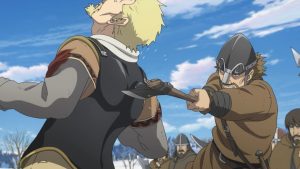
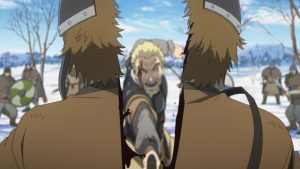
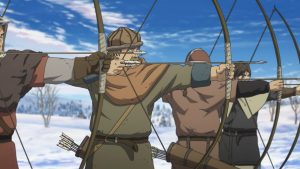
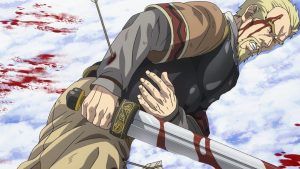
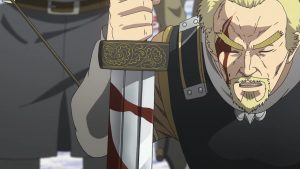
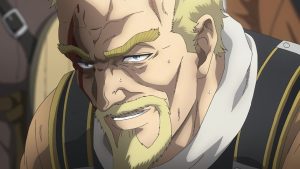
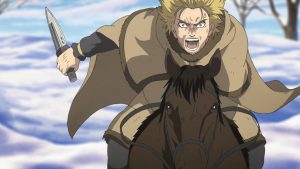
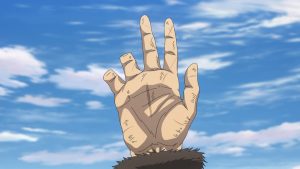

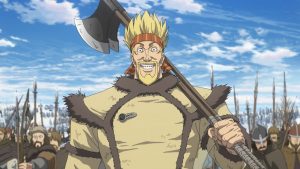
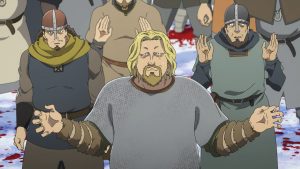
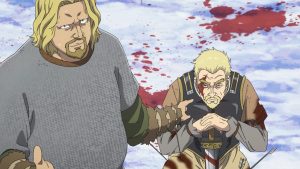
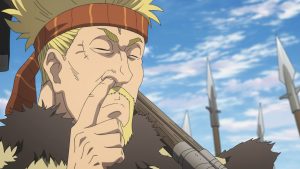
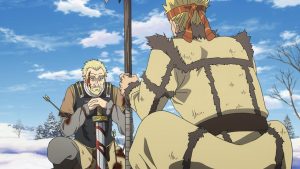
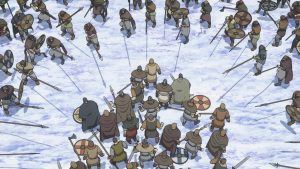
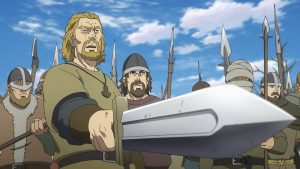
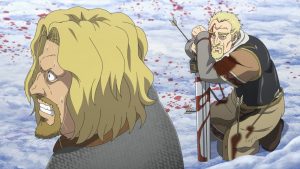
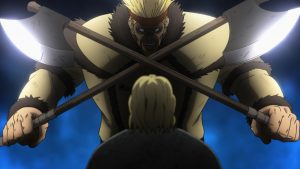
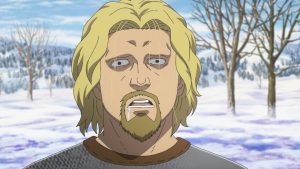
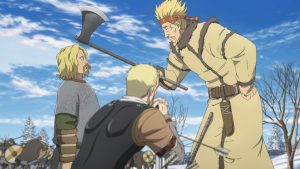
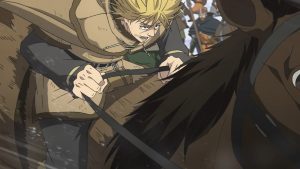
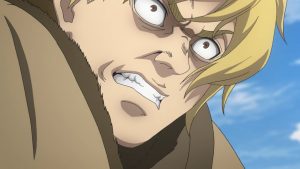
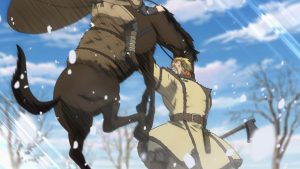
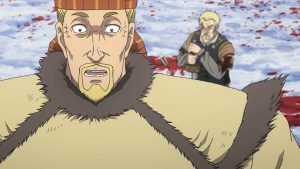
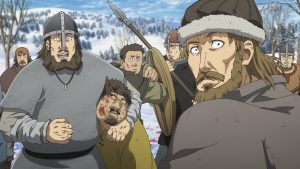
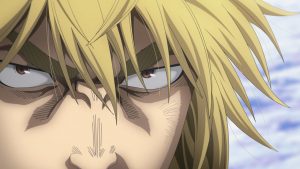
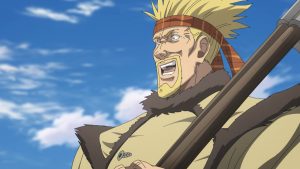
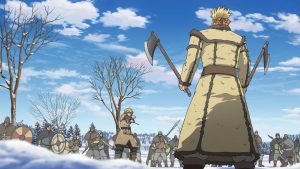
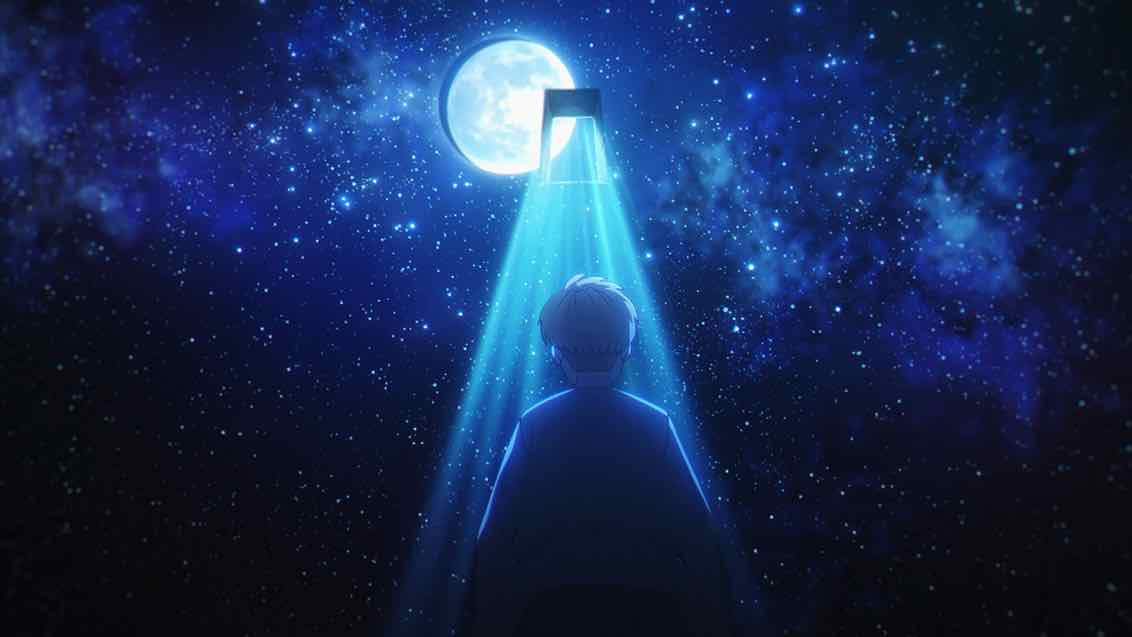
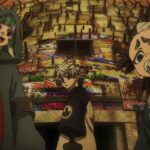
Marty
November 4, 2019 at 7:50 pmBlazing Saddles is amazing, I never made the connection between that scene and this episode.
On another note, I’m rather surprised they didn’t go for the archers right away, either they’re not too smart or they’re too prideful.
I can’t really blame the mutineers for what they did, after all their leader was apathetic to any losses they would suffer so long as the goal was accomplished, these guys simply want to live to see next winter and make some money, not drop like flies.
I remember someone pointed out to me when we watched the episode that at this point, Thorfinn spent more time with Askeladd than Thors, the man’s got to have SOME impact on his upbringing beyond the thirst for revenge.
What I’m worried about is Bjorn going berserk, everything would really be meaningless if he accidentally killed Canute, specially considering there really isn’t anyone there to stop him.
Guardian Enzo
November 4, 2019 at 8:53 pmWell, there is the priest…
Onix Franceschini
November 5, 2019 at 2:40 amI genuinely enjoy your posts and as a manga reader I simply cannot wait until this season folds. The ending will quell some of your fears, I think, though there is so very much left that won’t get adapted that is crucial to what you want from this saga.
danilo
November 5, 2019 at 8:58 amAs a manga reader, I think it is unfortunate that the best and quitest part of manga will most likely not be adapted.
Guardian Enzo
November 5, 2019 at 9:04 amGolden Kamuy shows us that there’s at least a tiny reason for hope. Admittedly that series is more tropey and approachable than this one, but there are commonalities – as witness the two mangakas’ mutual admiration. I think a second season is very unlikely but I haven’t totally given up. I’ve seen the odd VS merchandising tie-in (Tokyu Hands and the like) which can be an indication of at least modest popularity.
Onix Franceschini
November 5, 2019 at 11:51 pmThat whole arc was actually what cemented VS as one of the greats in my mind. So good. I do hope it gets adapted, Enzo. It deserves it.
Guardian Enzo
November 6, 2019 at 9:02 amIf not, many viewers will no doubt scramble to the manga to stay with the story. Roughly what volumes (don’t get too specific) is the arc in question a part of?
Onix Franceschini
November 6, 2019 at 8:54 pmThe show should end at the end of volume 8, and the arc in question starts in the last few chapters of said volume. I hope that isn’t too specific.
Guardian Enzo
November 6, 2019 at 9:01 pmThanks – honestly, I was just wondering if it had been scanlated (yes).
yustin
November 8, 2019 at 5:16 pmAnime of the year?
Guardian Enzo
November 8, 2019 at 7:09 pmIt’s on the short list, for sure.
Onix Franceschini
November 9, 2019 at 12:57 amBtw Enzo, just watched the episode and I highly recommend reading the manga from the start when this season is over. The episode lacked animation polish in a few significant scenes where the manga panels shined.
Color2413
November 11, 2019 at 6:35 pmI’m starting to have a serious “suspension of disbelief” problem with Vinland. Real humans can’t take the punishment meted out to many of the characters here without permanent injury. And everyone seems immune to frostbite. This inhuman invulnerability is getting too “Hollywood” for me, specifically Hollywood’s (unfortunate and relatively recent) insistence on having its action heroes suffer egregious injury (like multiple bullet wounds), yet rise miraculously to continue fighting (and often winning).
Granted, Vinland is a saga, and thus can tolerate a certain amount of exaggeration, like a bard weaving a fantastical tale to a hall full of half-drunk warriors. But these characters are not superheroes, and if they turn out to have supernatural powers, Vinland becomes a different kind of show.
After seeing 17 episodes I’m now inclined to rank Vinland below Dororo, which was upfront about its supernatural elements and premises, and wove them plausibly into the narrative. I also share Enzo’s concern about “redemption” in Vinland. Dororo had a strong story arc — the proverbial “beginning, middle, and end.” Is Vinland going to find a satisfactory stopping point, or is it doing to be one of those many animes with a bloody stump of an ending where the viewer is advised to “read the manga” to find out how the story continues?
Guardian Enzo
November 11, 2019 at 7:25 pmOne thing I would say is that Dororo is a much shorter story overall, and not only that, the anime had the luxury of more or less re-writing it for the space they had (because Tezuka pretty much bailed on it). The mangaka here recently said he was starting the “final arc” – which he expected to take 5 years to write…
On the frostbite thing, it’s not totally irrelevant that this is Britain rather than Scandinavia, so while it is winter it’s likely not nearly as cold. Also, as you say, this is a saga – it’s more about using events to illuminate the themes the author wants to explore than a historical re-enactment. Let’s face it, realism kind of went out the window when Thorkell showed up. I suspect when the story gets into its more contemplative and less shounen-y phase, the realism factor is going to uptick considerably.
As to which I’d rank higher, Dororo or VS, I guess we’ll find out in a few weeks…
jacob
November 15, 2019 at 4:09 amthis anime gonna be the anime of the year without a doubt